Related Research Articles

The diesel engine, named after Rudolf Diesel, is an internal combustion engine in which ignition of the fuel is caused by the elevated temperature of the air in the cylinder due to mechanical compression; thus, the diesel engine is called a compression-ignition engine. This contrasts with engines using spark plug-ignition of the air-fuel mixture, such as a petrol engine or a gas engine.
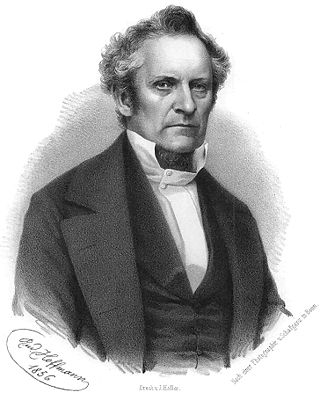
Julius Plücker was a German mathematician and physicist. He made fundamental contributions to the field of analytical geometry and was a pioneer in the investigations of cathode rays that led eventually to the discovery of the electron. He also vastly extended the study of Lamé curves.

The lux is the unit of illuminance, or luminous flux per unit area, in the International System of Units (SI). It is equal to one lumen per square metre. In photometry, this is used as a measure of the intensity, as perceived by the human eye, of light that hits or passes through a surface. It is analogous to the radiometric unit watt per square metre, but with the power at each wavelength weighted according to the luminosity function, a model of human visual brightness perception, standardized by the CIE and ISO. In English, "lux" is used as both the singular and plural form. The word is derived from the Latin word for "light", lux.
Károly Kerényi was a Hungarian scholar in classical philology and one of the founders of modern studies of Greek mythology.
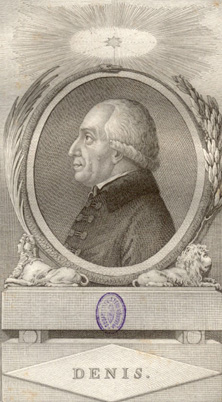
Johann Nepomuk Cosmas Michael Denis, also: Sined the Bard, was an Austrian Catholic priest and Jesuit, who is best known as a poet, bibliographer, and lepidopterist.

Baron Hermann von Soden was a German Biblical scholar, minister, professor of divinity, and textual theorist.
Sturm und Drang was a proto-Romantic movement in German literature and music that occurred between the late 1760s and early 1780s. Within the movement, individual subjectivity and, in particular, extremes of emotion were given free expression in reaction to the perceived constraints of rationalism imposed by the Enlightenment and associated aesthetic movements. The period is named after Friedrich Maximilian Klinger's play of the same name, which was first performed by Abel Seyler's famed theatrical company in 1777.
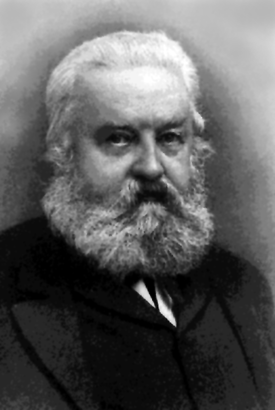
Friedrich Moritz Brauer was an Austrian entomologist who was Director of the Naturhistorisches Hofmuseum, Vienna, at the time of his death. He wrote many papers on Diptera and Neuroptera.
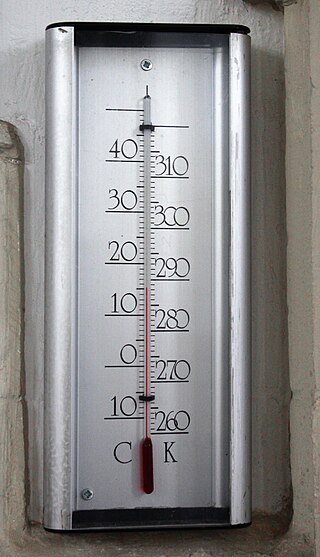
The kelvin, symbol K, is a unit of measurement for temperature. The Kelvin scale is an absolute scale, which is defined such that 0 K is absolute zero and a change of thermodynamic temperature T by 1 kelvin corresponds to a change of thermal energy kT by 1.380649×10−23 J. The Boltzmann constant k = 1.380649×10−23 J⋅K−1 was exactly defined in the 2019 redefinition of the SI base units such that the triple point of water is 273.16±0.0001 K. The kelvin is the base unit of temperature in the International System of Units (SI), used alongside its prefixed forms. It is named after the Belfast-born and University of Glasgow-based engineer and physicist William Thomson, 1st Baron Kelvin (1824–1907).

Barbara Aland, née Ehlers is a German theologian and was a Professor of New Testament Research and Church History at Westphalian Wilhelms-University of Münster until 2002.
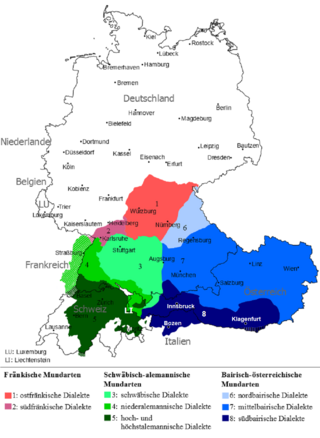
Upper German is a family of High German dialects spoken primarily in the southern German-speaking area.
Deutscher Science Fiction Preis is a German literary award. Together with the Kurd-Laßwitz-Preis, it is one of the most prestigious awards for German science fiction literature. The award was established in 1985 by the Science Fiction Club Deutschland, a German Science Fiction society. Each year, the award is given to the best German science fiction short story and the best German novel from the previous year.
Value criticism is a social theory which draws its foundation from the Marxian tradition and criticizes the contemporary mode of production. Value criticism was developed partly by critical readings of the traditions of the Frankfurt School and critical theory. Prominent adherents of value criticism include Robert Kurz, Moishe Postone and Jean-Marie Vincent.
In set theory, the Schröder–Bernstein theorem states that, if there exist injective functions f : A → B and g : B → A between the sets A and B, then there exists a bijective function h : A → B.

Hans-Gerhart "Joscha" Schmierer is a German politician and author.
The Alb Limes is a Roman frontier fortification or limes of the late 1st century AD in the Swabian Jura, also known as the Swabian Alb. The Alb Limes runs for just under 135 kilometres from Rottweil in the southwest to Heidenheim an der Brenz in the northeast.
Fred K. Prieberg was a German musicologist. He was a pioneer in the field of history of music and musicians under the Nazi regime.
The military ranks of the Weimar Republic were the military ranks used by the Reichswehr.
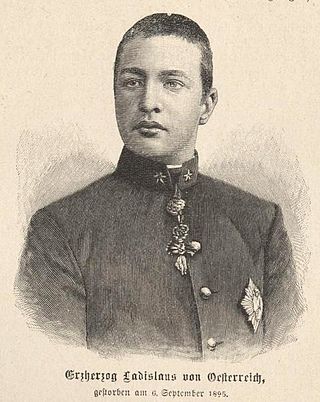
Archduke László Philipp Marie Vincent Ladislaus of Austria was a member of House of Habsburg as the second son of Archduke Joseph Karl of Austria and an officer of the Austro-Hungarian Army.
References
- ↑ Handbuch des Allerhöchsten Hofes und des Hofstaates Seiner K. und K. Apostolischen Majestät., Vienna: K.k. Hof- und Staatsdruckerei, 1917, p. 519